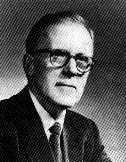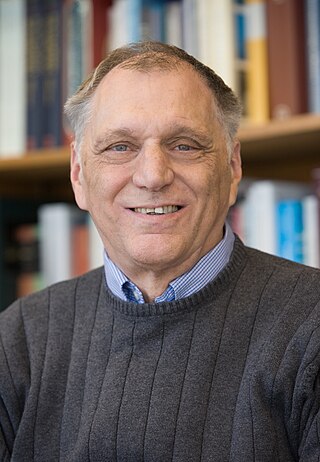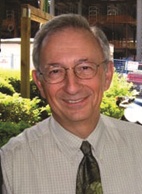Related Research Articles

Donald Olding Hebb was a Canadian psychologist who was influential in the area of neuropsychology, where he sought to understand how the function of neurons contributed to psychological processes such as learning. He is best known for his theory of Hebbian learning, which he introduced in his classic 1949 work The Organization of Behavior. He has been described as the father of neuropsychology and neural networks. A Review of General Psychology survey, published in 2002, ranked Hebb as the 19th most cited psychologist of the 20th century. His views on learning described behavior and thought in terms of brain function, explaining cognitive processes in terms of connections between neuron assemblies.

The Faculty of Medicine at the University of Ottawa is a bilingual medical school in Ottawa, Ontario, Canada founded in 1945. It is located at a campus centred on Roger-Guindon Hall in the east end of Ottawa and is attached to the Ottawa Hospital's General Campus. The Health Sciences Complex is separate from the downtown University of Ottawa campus.

George F. Koob is a Professor and former Chair of the Committee on the Neurobiology of Addictive Disorders at the Scripps Research Institute and Adjunct Professor of Psychology, Psychiatry, and Skaggs School of Pharmacy and Pharmaceutical Sciences at the University of California, San Diego. In 2014 he became the director of the National Institute on Alcohol Abuse and Alcoholism.

Patricia Goldman-Rakic was an American professor of neuroscience, neurology, psychiatry and psychology at Yale University School of Medicine. She pioneered multidisciplinary research of the prefrontal cortex and working memory.
Barry John Everitt, is a British neuroscientist and academic. He was Master of Downing College, Cambridge (2003–2013), and Professor of Behavioural Neuroscience at the University of Cambridge (1997–2013). He is now emeritus professor and Director of Research. From 2013 to 2022, he was provost of the Gates Cambridge Trust at Cambridge University.
S. Larry Goldenberg, is a Canadian researcher in the field of medicine and a pioneer in the treatment of prostate cancer.

Larry Ryan Squire is a professor of psychiatry, neurosciences, and psychology at the University of California, San Diego, and a Senior Research Career Scientist at the Veterans Affairs Medical Center, San Diego. He is a leading investigator of the neurological bases of memory, which he studies using animal models and human patients with memory impairment.

Gerald D. Fischbach is an American neuroscientist. He received his M.D. from the Weill Cornell Medical College of Cornell University in 1965 before beginning his research career at the National Institutes of Health in 1966, where his research focused on the mechanisms of neuromuscular junctions. After his tenure at the National Institutes of Health, Fischbach was a professor at Harvard University Medical School from 1972 to 1981 and from 1990 to 1998 and the Washington University School of Medicine from 1981 to 1990. In 1998, he was named the director of the National Institute of Neurological Disorders and Stroke before becoming the Vice President and Dean of the Health and Biomedical Sciences, the Dean of the Faculty of Medicine, and the Dean of the Faculty of Health Sciences at Columbia University from 2001 to 2006. Gerald Fischbach currently serves as the scientific director overseeing the Simons Foundation Autism Research Initiative. Throughout Fischbach's career, much of his research has focused on the formation and function of the neuromuscular junction, which stemmed from his innovative use of cell culture to study synaptic mechanisms.

Albert Gjedde: is a Danish-Canadian neuroscientist. He is Professor of Neurobiology and Pharmacology at the Faculty of Health Sciences and Center of Neuroscience at the University of Copenhagen. He is currently also Adjunct Professor of Neurology and Neurosurgery in the Department of Neurology, Montreal Neurological Institute, McGill University, Montreal, Quebec, Canada, Adjunct Professor of Radiology and Radiological Science in the Division of Nuclear Medicine, Department of Radiology and Radiological Science, Johns Hopkins University, Baltimore, Maryland, US, Adjunct Professor of Translational Neuropsychiatry Research, University of Southern Denmark, Odense, Denmark, and adjunct professor of psychiatry at Tabriz University of Medical Sciences, Tabriz, East Azerbadjan, Iran.
Mustafa al’Absi is a Yemeni academic who is a Professor of Behavioral Medicine and the holder of the Max & Mary La Due Pickworth Chair at University of Minnesota Medical School. Al'Absi also holds faculty positions at Department of Family Medicine, Department of Biomedical Sciences, Department of Neurosciences, and the Integrated Biological Science Program. He is the founding director of the Duluth Medical Research Institute (DMRI), the Behavioral Medicine Laboratories, and the Khat Research Program (KRP). Al’Absi completed his undergraduate education at Cairo University and his doctoral training at the University of Oklahoma in biological psychology with specialization in clinical psychology and behavioral medicine.

The Faculty of Medicine at Dalhousie University, also known as Dalhousie Medical School, is a medical school and faculty of Dalhousie University in Halifax, Nova Scotia, Canada.
William Maxwell Cowan was a South African neuroscientist known for his work on developmental plasticity and neural connectivity. He is credited with helping to contribute to the growth of modern neuroanatomy through his use of novel anterograde tracing techniques which fundamentally transformed the field in the 1970s. From 1978–2002 Cowan was the founding editor of the Annual Review of Neuroscience. Cowan was vice-president and chief scientific officer of the Howard Hughes Medical Institute from 1987 until his retirement in 2000.

Bernard H. Bressler FCAHS is a Professor in the Department of Cellular and Physiological Sciences and an Associate Member in the Department of Orthopedics at the University of British Columbia (UBC).
Stan Kutcher is a Canadian Senator and Professor Emeritus of Psychiatry at Dalhousie University. He was appointed to the Senate of Canada on 12 December 2018.

Irene Mary Carmel Tracey is Vice-Chancellor of the University of Oxford and former Warden of Merton College, Oxford. She is also Professor of Anaesthetic Neuroscience in the Nuffield Department of Clinical Neurosciences and formerly Pro-Vice-Chancellor at the University of Oxford. She is a co-founder of the Oxford Centre for Functional Magnetic Resonance Imaging of the Brain (FMRIB), now the Wellcome Centre for Integrative Neuroimaging. Her team’s research is focused on the neuroscience of pain, specifically pain perception and analgesia as well as how anaesthetics produce altered states of consciousness. Her team uses multidisciplinary approaches including neuroimaging.
Sherry Heather Stewart is a Canadian clinical psychologist. She is also a Professor of Psychiatry and Psychology at Dalhousie University and a Tier 1 Canada Research Chair in Addiction and Mental Health.
William D. Willis was a neuroscientist and a pioneer in researching pain pathways in the body. He investigated how pain travels through the body and is received in the brain.

John H. "Jack" Byrne an American neuroscientist, is the Virgil and June Waggoner Chair of Neurobiology and Anatomy at McGovern Medical School in Houston, Texas.
Susan Anne Kirkland is a Canadian epidemiologist. She is the Associate Director of the Geriatric Medicine Unit at Dalhousie University and one of three Principal Investigators on the Canadian Longitudinal Study on Aging.
References
- ↑ "Dalhousie Anatomy and Neurobiology Faculty and Administration". Anatomy.medicine.dal.ca. Retrieved 2011-03-12.
- ↑ "Cross-Appointed Faculty - Department of Psychology". Psychology.dal.ca. 2010-10-14. Retrieved 2011-03-12.
- ↑ "Staff profile, La Trobe University". Latrobe.edu.au. 2010-08-12. Retrieved 2011-03-12.
- ↑ "Department of Medical Neuroscience".
- ↑ "Maritime Noon | Phone-In Regulars". CBC.ca. 2009-06-25. Retrieved 2011-03-12.
- ↑ Ingram, Jay (2010). Daily Planet: The Ultimate Book of Everyday Science. Penguin Canada. p. 145. ISBN 978-0-14-317786-9.
- ↑ "Department of Medical Neuroscience".
- ↑ "Department of Medical Neuroscience".
- ↑ Atlantic Provinces Council on the Sciences Biennial Report April 1, 2001 – March 31, 2003 http://apics.dal.ca/members/Biennial%20Report%20Apr01-Mar03.pdf
- ↑ "People". dalnews.dal.ca. 2002-12-11. Retrieved 2011-03-12.
- ↑ "Past Ig Winners". August 2006.